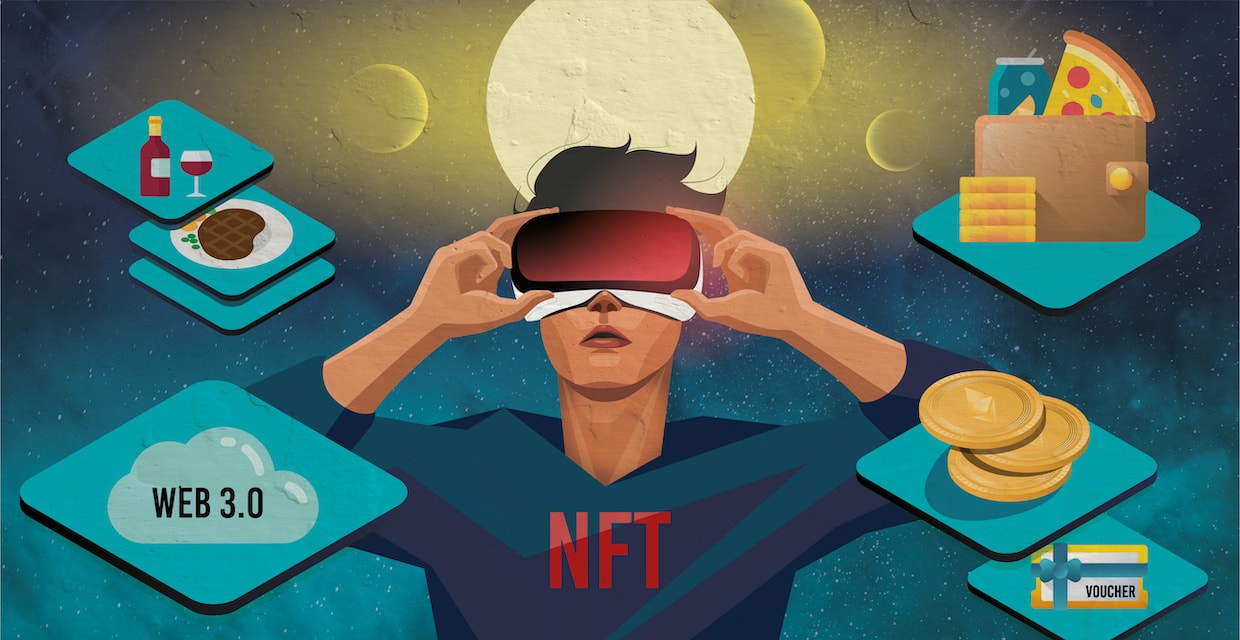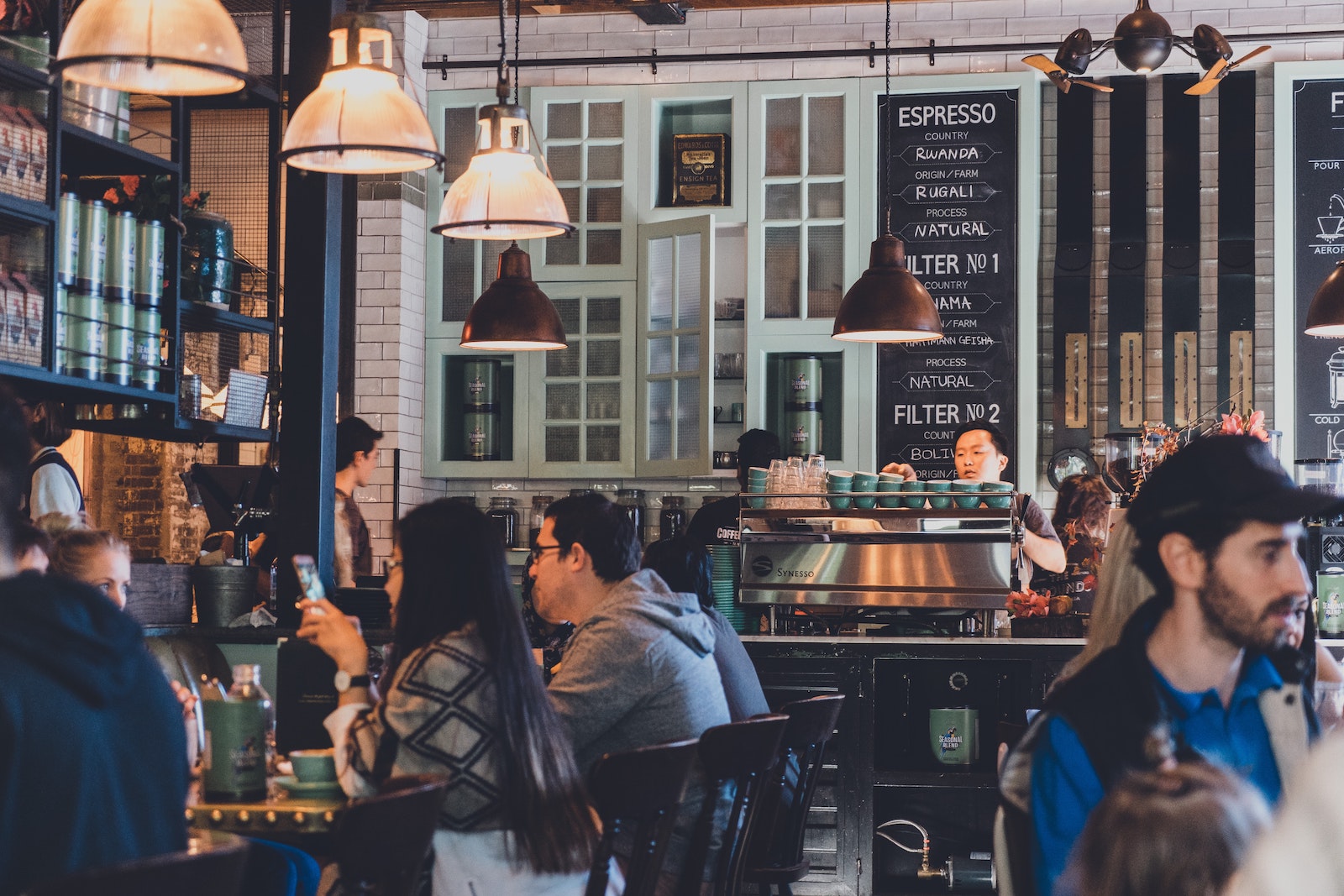NFTs in Hospitality: A Hype or a Model for the Future?
NFTs open up many possibilities in a wide range of industries, including hospitality. But how can you use them in your hospitality business? Read...
More and more restaurants are starting to explore the possibilities of NFTs. Let us show you some hospitality concepts that deal with NFTs, Web3 & more.

This is the second part of the article series on NFTs in the hospitality industry. You can read the first part here.
Imagine this: A restaurant is celebrating its grand opening. But there is no seating inside the restaurant, only four main dishes are offered, and the wait time is more than three hours. Doesn't sound very inviting, does it?
But 1,500 people saw it differently when they flocked to the opening of the Bored & Hungry restaurant in California in April 2022. What's special about this restaurant is that it takes advantage of the hype surrounding cryptocurrencies and integrates this into its interior design and marketing – all based on the Bored Ape Yacht Club, one of the world's most famous NFT collections.
However, this isn't the only hospitality concept that explores themes of cryptocurrency, NFTs, and Web3. In this Utopia Gastronomica article I'll show you what other inspiring and unique uses there are, and how smaller restaurants can benefit as well.
NFT stands for non-fungible token. The tokens in this case are nothing more than an asset. This makes NFTs a unique digital asset that cannot be exchanged with others.
Non-fungible tokens are based on the blockchain technology. Here, data is stored in a decentralized manner, i.e. in a network of multiple computers. As the name suggests, a blockchain is made up of blocks. Each block is connected to the preceding one – this forms the chain.
At the beginning of 2022, I participated in a virtual mini-summit hosted by the American food tech company, The Spoon. At the event, chefs, entrepreneurs, restaurateurs, food and beverage brand representatives, and others in the food tech industry gathered to discuss how food can be connected to the Metaverse and Web3.
The focus was on how virtual worlds, the Metaverse and NFTs are shaping the future of the food industry and what concepts are being used in the food tech space to do so. I would now like to introduce you to projects that were presented at the summit.
With the name CHFTY Pizzas, the two celebrity chefs and gastronomy experts Tom Colicchio and Spike Mendelsohn have published a collection of NFTs on the Ethereum blockchain. The chefs aim to bridge the gap between the F&B industry and Web3.
The collection includes 2777 unique NFTs. Each non-fungible token features a cartoon-like image of a pizza slice, each with its own characteristics.
Welcome to CHFTY📍
— CHFTY Pizzas🍕 (@CHFTYPizzas) March 23, 2022
🍕 Our Team: Visionaries rockstar chefs @tomcolicchio @chefspike
🍕 Our Vision: Connect Web3 w/ Chefs & Foodies alike
🍕 Our Utility: Digital & IRL Events, Custom Merch & Accessories, + So Much More
CHFTY Pizzas Public Sale tomorrow, 3/24 @ 3PM EST🚀 pic.twitter.com/ddSDzIuv1z
The retail price was 0.07 Ethereum per image, which (at the time of writing) is equivalent to about $118. Owners of the CHFTY Pizzas NFTs received some benefits, such as access to cooking classes, merchandise, and pizza parties with Mendelsohn, Colicchio, and other celebrity chefs.
This allows a restaurant to grow far beyond the boundaries of its on-site business. [...] So we can either sit there and say: No, we're not doing that. Or we can embrace it and get in front of it. And I think that's what Spike [Mendelsohn] and I are doing.
– Tom Colicchio on coming up with the CHFTY Pizzas project.
Another concept presented during the summit was OneRare – the world's first food Metaverse. The project brings the global F&B industry to Web3 in a fun way. It is an NFT economic game that works with celebrity chefs, restaurants and food brands to mint non-fungible tokens for their dishes.
The gaming zone, developed by OneRare, is divided into four areas where users can engage in various activities:
| Farm: Players can grow ingredients by staking in-game tokens (ORARE) in six available staking pools.* As a reward, users receive NFTs in the form of ingredients. | |
| Farmer's Market: The Farmer's Market is where players can sell their ingredients at their desired price. | |
| Kitchen: This is where the ingredients are used to prepare a dish. To do this, the Ingredient NFTs are exchanged for Dish NFTs. For example, if a player wants to make an NFT French Fry, he or she needs the necessary ingredients in form of non-fungible tokens – in this case potatoes, salt and cooking oil. | |
| Playground: Once a player has collected a Dish NFT and added it to their wallet, he or she can participate in mini-games at the Playground. Here, OneRare users compete against each other with their unique Dish NFTs. |
* In simple terms, staking means freezing a cryptocurrency over a period of time via a pool and receiving rewards in return. In a pool, multiple stakeholders join together to pool their resources to increase the chance of receiving a reward.
When I attended the food-tech summit, I was blown away by how many fascinating Web3 projects had already been devised and implemented. This inspired me to further research what else the new digital world has to offer in the hospitality industry. The following section is a selection of hospitality concepts that deal with non-fungible tokens, Web3 and cryptocurrencies.
At the beginning of this article, I've already briefly mentioned the Bored & Hungry restaurant. The cryptocurrency-themed fast food restaurant is marketed around the Bored Ape Yacht Club – one of the most popular NFT collections on the Ethereum blockchain. The collection includes 10,000 unique cartoon images of monkeys depicted with various accessories and features.
The menu at the Bored & Hungry restaurant includes smash burgers, plant-based burgers, fries, and soft drinks. Guests can pay not only with U.S. dollars, but also with two cryptocurrencies: Ethereum and ApeCoin (the currency developed by Bored Ape Yacht Club).
The NFTs in the Bored Ape Yacht Club collection are integrated into the décor and branding of the venue, from cardboard displays to murals to designs on the floor.
Like McDonald's or Chipotle, the American fast food chain Wendy's has announced to join the Metaverse. Under the name Wendyverse, the company has been offering a virtual reality experience in collaboration with Meta since April 2022.
In the virtual world of Wendy's, visitors can interact with others, participate in various mini-games or explore the virtual restaurant. Although guests can't order food into the real world in the Wendyverse (at least not yet), they have the opportunity to win gift cards to real Wendy's stores.
GourmetNFT is a platform where culinary experts can turn their recipes into non-fungible tokens. The team behind the project wants to support chefs and create additional value for them from their recipes.
The recipes are available in different price ranges, so that any interested person can collect NFT recipes. In order for the non-fungible tokens to be unique, they must contain bonus material, such as insider tips or personal videos.
The examples I've shown you are specifically designed for larger businesses and restaurant chains. Or are aimed at restaurateurs who have a wide audience in the industry. But what about smaller restaurants? How can they benefit from non-fungible tokens and Web3?

The food tech company The Spoon released a podcast episode about this, explaining the opportunities and benefits of NFTs and the Metaverse for smaller restaurants. What particularly stuck with me is:
| You don't have to be a large restaurant chain or a five star restaurant with celebrity chefs to harness the potential of digital, non-exchangeable assets. | |
|
Smaller restaurants who know their best customers through loyalty programs, for example, can offer them a unique NFT. However, the non-fungible tokens are limited to a certain numbers – this highlights the unique and special value. Those who own a non-exchangeable digital asset enjoy preferences: reservations are always possible, invitations to events, special offers when ordering online etc. |
|
|
While currently NFTs are of more relevance to the restaurant industry, the Metaverse is an equally interesting option – at least as far as the future is concerned. Restaurants that want to join the virtual world need to create an experience that is not possible in the real world due to factors such as cost or distance. |
To give an example: Let's say you run a café and source coffee beans from a farm in South America. Instead of just serving coffee to your guests in the Metaverse, you can also offer them a tour of the farm. By doing so, you create an interactive and immersive experience that delivers entertainment.
In terms of understanding NFTs, Web3 and Metaverse, I think we're still in the beginning stages. It will take some time to understand all of this in detail; but it makes perfect sense to keep this on your radar, look into it and work out the benefits and opportunities for your own business. Not only does this provide an additional revenue stream, but it also sets you apart from competitors.
The fact that you don't have to be a larger businesses to gain a foothold in the NFT world is demonstrated by the American burger restaurant Menches Bros. This family-run business announced that it will begin selling non-fungible tokens on the Ethereum blockchain.
By using this technology, the Menches Bros. team hopes to build a larger customer base without having to build new stores.
Nothing better than a burger on lil Mench Mondays 💛#burger #NFTCollection #NFTs #foodnfts pic.twitter.com/R1mbJ9GwJP
— lil Mench (@LilMenchNFT) July 18, 2022
When the 5655 cartoon-like burger tokens will be available for purchase at Menches Bros. has not yet been announced. What we do know is that 1855 non-fungible tokens will be reserved for the restaurant's regional customers, who will receive a 20 % discount for a year when they pick up the food and drinks or have them delivered to their homes.
Likewise, non-fungible token holders will enjoy other benefits, such as access to a secret crypto burger menu, invitations to special events, or receive the Menches Bros. secret spice blend recipe.
The opportunities and benefits of NFTs, Web3 and Metaverse for the restaurant industry are enormous. And we are just at the beginning. In the next few years, a lot will take shape in this area and more and more companies will get closer to it all and get a foothold in the new, digital world in their own way.
There will always be a need for restaurants in the real world – that's not going to change. But the many opportunities that Web3 brings should be seized. I, for one, am already looking forward to seeing how more restaurants and restaurateurs will bridge the gap between the real and digital world.
NFTs open up many possibilities in a wide range of industries, including hospitality. But how can you use them in your hospitality business? Read...
We show you how we as a company approach the path towards sustainability and what ideas we have developed to achieve this. Read more here.
What are the advantages of starting your own restaurant delivery service? What makes this different from external delivery services? Read more here.
Make sure you never miss out on updates and trends about digitalization in the hospitality industry by subscribing to our monthly newsletter. You will receive useful information delivered directly to your inbox.